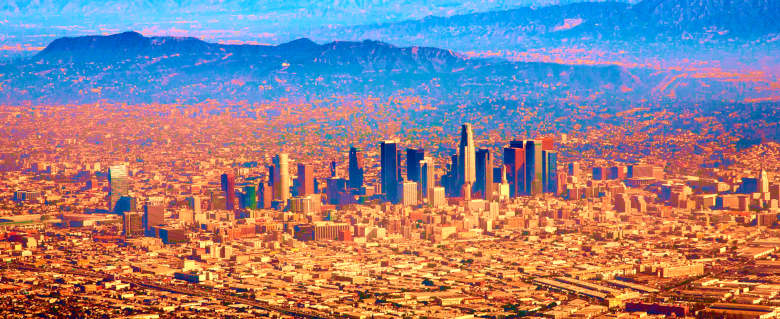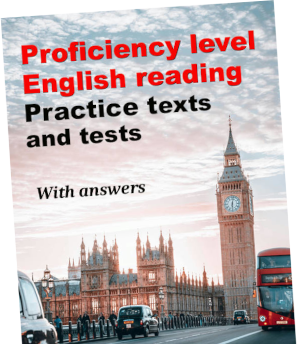Advanced level English
►
For
vocabulary guide, see
below.
►
Note: Audio
version. There
are twelve small differences of expression between the audio and
printed
texts.
Curious creatures, humans, aren't they !
Throughout history, humans have
willingly set up home in areas of great danger, knowing that from one
day to the next, their civilization or their city could be devastated.
Atlantis, Minos, Pompeii; history is full of the legends or stories of
cities that have perished.
Perhaps, one day, Los Angeles will join
the list. .
Like San Francisco, Los Angeles lies astride one of the most active geological fault lines on our planet, the San Andreas Fault.
Every few years, city buildings tremble and sway as Los Angeles is rocked by an earthquake. Often, millions of dollars worth of damage are done, and lives are lost; but the effect on Angelenos is little, and short lived. Few Angelenos pack their bags and move out of town after an earthquake; most shrug their shoulders, and get on with the job, making money, enjoying life, bringing up a family, or whatever.
Best sellers from Linguapress

According to niare scenarios, whole sections of the ultra-chic L.A. suburbs of Palos Verdes and Malibu could slide into the sea (as little bits do from time to time already); a major quake centered in the city in mid summer could set off fires that could rage uncontrolled for weeks on end. There is no limit to the extravagance of the disaster scenarios that can be imagined, as Hollywood - on the spot and in the know - has not failed to realise.
Other potential disasters
Yet a direct hit by the "Big One" is just one of many potential disasters that could befall L.A. If an earthquake or some other event were to cut off the city's water supplies for more than 24 hours, L.A. would begin to disintegrate. Located on and around a hot coastal plain where it does not often rain, L.A. can only survive thanks to vast aqueduct systems that bring in millions of gallons of water a day from hundreds of miles away. A prolonged power failure, or disruption of gasoline supplies, could be just as devastating.The dry landscape round L.A. is also particularly susceptible to fire, as was demonstrated in recent years, when uncontrolable bush fires destroyed many luxury homes on the outskirts of the city.
Apart from the fact that there is (as yet) no local volcano on the edge of L.A., and that tornadoes are unknown in this part of the U.S.A., the risk of natural disaster is greater in L.A. than any other U.S. city.
[End of recorded audio text]
San Francisco, devastated by an earthquake in 1906 and seriously rocked in 1989, is just as much at risk from an earthquake as L.A. - though less at risk from other causes.
In both of California's big cities, schools and workplaces are required to have earthquake emergency procedures, designed to minimize loss of life; and all modern buildings must be built according to strict regulations. When the "Big One" comes, it is sure to do a lot of damage; but when will it come? that's a question to which everyone would like to know the answer!.
WORDS
brink: edge - astride: on top of, on both sides of - sway: move from side to side - earthquake: when the earth trembles - shrug: raise - seismologist: scientist who studies earthquakes - on the spot: in this place - in the know: with all the information - befall: happen to - power failure: when all the lights go out - outskirts: peripheral districts, suburbs - This article,
and exercises to go with it, are included in the new Linguapresspaperback collection
of B2+ / C1 advanced English reading texts, A
Background to Modern America, available from Amazon worldwide and leading
bookstores, including Barnes
& Noble and Waterstones.
This article,
and exercises to go with it, are included in the new Linguapresspaperback collection
of B2+ / C1 advanced English reading texts, A
Background to Modern America, available from Amazon worldwide and leading
bookstores, including Barnes
& Noble and Waterstones.
Copyright © Linguapress. Do not copy this document to any other website
Copying permitted for personal study, or by teachers for use with their students
STUDENTS' WORKSHEET - printable
Los Angeles - City on the brink
Interactive gap-fill exercise. Use on screen or on paper : expressions
Select the correct word from the drop-down lists .
(To save your answers, take a screenshot when you have completed the
task)
Apart the fact that there is (as ) no local volcano on the edge of L.A., and that tornadoes are unknown in this part of the U.S.A., the risk of natural disaster is greater in L.A. any other U.S. city.
Creative writing - text contraction
Contract this article into six sentences of not more than 25 words each, using the prompts given. Boxes will expand to take the text that you write.
Los Angeles grew .
Los Angeles's new businesses .
Freeways .
There are more .
Angelenos have to.
Rephrasing
Rephrase each of the following sentences, starting with the prompts given.L.A. could .
If an earthquake or some other event were to cut off the city's water supplies for more than 24 hours, L.A. would begin to disintegrate.
Water supplies .
L.A. can only survive thanks to vast aqueduct systems that bring in millions of gallons of water a day from hundreds of miles away..
Millions of gallons of water.
The dry landscape round L.A. is also particularly susceptible to fire.
Fire ..
Comprehension questions
Choose the correct answer from the four options given, for each of the following questions based on the article.Question 1:What is the main point of the article?
a) To discuss the history of cities destroyed by natural disasters. b) To highlight the dangers faced by Los Angeles due to its location and environment. c) To compare the risk of earthquakes in Los Angeles and San Francisco. d) To explain why Californians must be prepared for earthquakes.Question 2: What is the "Big One" referred to in the article?
a) A major earthquake predicted to hit California. b) A large-scale wildfire in the Los Angeles area. c) A severe drought that could leave the city without water. d) A significant power failure affecting the entire city.Question 3: Why is Los Angeles particularly vulnerable to water shortages?
a) It experiences frequent droughts. b) Its water supply is dependent on external sources. c) It has a large population with high water consumption. d) Its water infrastructure is outdated and in poor condition.Question 4: How do Angelenos typically react to earthquakes?
a) They panic and try to get away from the city. b) They are deeply affected and experience long-term trauma. c) They show resilience and carry on with their lives. d) They demand immediate action from the government.Question 5: What measures are being taken to prevent earthquake damage in Los Angeles and San Francisco?
a) Evacuation plans for high-risk areas. b) Construction of earthquake-resistant buildings. c) Relocation of populations to safer zones. d) Development of advanced earthquake prediction technology.Question 6: What does the article suggest about the likelihood of a major earthquake in California within the next 50 years?
a) It is highly unlikely. b) It is a remote possibility. c) It is a strong probability. d) It is impossible to predict.Question 7: Besides earthquakes, which other natural disasters are mentioned as potential threats to Los Angeles?
a) Floods and hurricanes b) Volcanic eruptions and tsunamis c) Wildfires and water shortages d) Landslides and sinkholesQuestion 8: What conclusion can be drawn about human behavior based on the examples of Atlantis, Minos, and Pompeii?
a) Humans are inherently drawn to dangerous environments. b) Humans are incapable of learning from past mistakes. c) Humans are overly optimistic about their safety. d) Humans are resistant to change and adaptation.For teachers
Audio text
The twelve differences between the audio and screen version of the text do not involve any changes of meaning; they are merely alternative ways of expressing ideas, or in a couple of cases changes in the word order.
Comprehension
Designed to provoke careful reading of the article, and test students' comprehension, this multiple choice exercise is based on a model used in TOEFL, IELTS and other language certification tests. Correct answers:
1 b, 2 a, 3 b, 4 c, 5 b, 6 c, 7 c, 8 a
Role play activity
Pair work / small group (up to four per group)
The Governor of California has alerted citizens to the imminent risk of an earthquake / or/ a serious shortage of water in the coming weeks. Imagine a discussion / argument between husband and wife (or two partners), or between parents and children, or between an Emergency Department medic who knows that s/he must stay at work, and his/her partner who wants to get out of the danger zone




 Copyright
information.
Copyright
information.